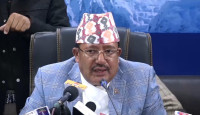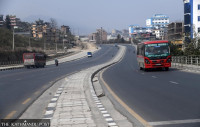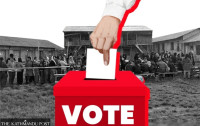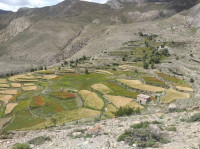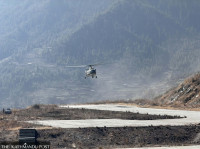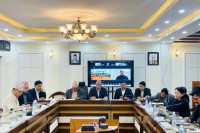National
Dahal seeks international support to save democracy in Nepal
It’s nearly two months since Oli dissolved the House, but major countries, including India, the US, the UK and China, have opted not to speak up on the political situation here.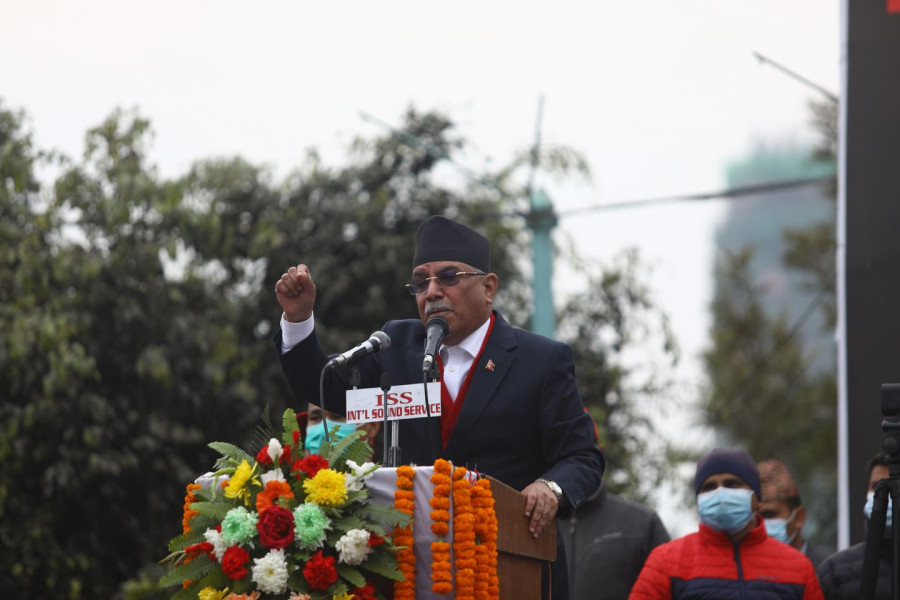
Anil Giri
Former prime minister Pushpa Kamal Dahal, also the chair of one faction of the Nepal Communist Party, has sought support from the international community to protect democracy in Nepal, which he said was under threat from Prime Minister KP Sharma Oli.
“Democracy has been murdered in Nepal,” said Dahal while addressing a mass meeting organised by his faction in Kathmandu on Wednesday to protest against Oli’s December 20 move of dissolving the House of Representatives.
“We call upon the international community… particularly those who call themselves the world’s largest democracy and those who believe in democratic values and norms, and our neighbours to speak up against Oli’s move.”
The Nepal Communist Party led by Dahal and Madhav Kumar Nepal has been holding protests against Oli ever since he dissolved the House. Two days after the House was dissolved, the Nepal Communist Party split, at least politically as the legal dispute over the legitimacy is pending at the Election Commission.
Dahal and Nepal claim the Nepal Communist Party as their own, but the Oli faction says the party is theirs.
The Dahal-Nepal faction’s mass gathering on Wednesday follows the Oli faction’s similar programme on Friday.
Dahal had made a similar statement, seeking international community’s support, on Tuesday as well while interacting with foreign correspondents based in Kathmandu.
Except Dahal, no other leader from his faction, however, made an appeal to the international community.
It's been a little less than two months since Oli dissolved the House, which experts on constitutional matters in Nepal have described as a constitutional coup, but the international community by and large has chosen not to take any position.
India was the first country to react.
“We have noted the recent political developments in Nepal. These are internal matters for Nepal to decide as per its democratic process,” Anurag Srivastava, spokesperson for India’s Ministry of External Affairs, said during a regular press conference on December 24 in response to the media query on Nepal. “As a neighbour and well-wisher, India will continue to support Nepal and its people in moving forward on the path of peace, prosperity and development.”
World powers like the United States of America and the United Kingdom, and Nepal’s northern neighbour, China, however, have kept mum.
At least two diplomatic sources from the western embassies in Kathmandu told the Post that a virtual meeting of the ambassadors and representatives of European countries, the United States, the United Kingdom and Australia was called 10 days ago to discuss the latest political situation in Nepal. Indian and Chinese ambassadors, however, were not present.
“The idea was to make a common position on Oli’s move after dissolution of the House but ambassadors from European countries and others were largely divided,” said a diplomatic source who did not wish to be named. “No formal statement was issued because no common position could be made.”
On February 1, during an interaction with a group of journalists, US Ambassador Randy Berry said that it would be presumptuous to make any statement when the Supreme Court is there to look after the constitutional principle.
“And that is the part of a process,” said Berry. “America’s engagement has consistently been in support of democracy, in support of those institutions. And sometimes these processes take some time to play.”
The Supreme Court has been conducting a hearing on as many as 13 petitions that have been filed against House dissolution.
Asked about the split in the Nepal Communist Party as a result of Oli’s House dissolution, Berry said that his country “has no view or position regarding the rift in the Nepal Communist Party”.
He, however, described political divisions and conflicts as part of democratic processes.
Analysts believe foreign countries may have opted not to speak on the political situation also because the Nepal Communist Party has yet to split legally.
The Post’s requests via email to the embassies of the United Kingdom and the European Delegation in Kathmandu on Nepal’s political situation were unanswered until this paper went to press on Wednesday.
China, which had rushed a delegation led by a senior leader of the Chinese Communist Party to “assess the ground situation” in Kathmandu, in December last week called on Nepal’s political parties to maintain unity and stability.
According to the Chinese Foreign Ministry, during a telephonic conversation with Foreign Minister Pradeep Gyawali, Chinese Foreign Minister Wang Yi expressed concerns over political developments in Kathmandu.
“As a friendly neighbour, China hopes that all parties and factions in Nepal will bear in mind the fundamental and long-term interests of the country and its people, seek common ground while shelving differences, and maintain unity and stability, so as to create favorable conditions and environment for its own development and prosperity,” read a Chinese Foreing Ministry statement on February 5.
According to the statement, Wang said that China adheres to the principle of non-interference in other countries' internal affairs and respects the development path chosen by the Nepali people.
The diplomatic sources said foreign missions don’t seem to be in a rush to make any position because they don’t view Oli’s House dissolution move as a political takeover—like the one orchestrated by king Gyanendra in 2005.
Second, according to the sources, the foreign missions do not want to speak up on Nepali politics as yet, as its political course will be determined by the Supreme Court’s verdict. And third, they said, they have to work with different parties and the governments they lead so speaking anything now could give a message that they are taking sides.
Dahal’s repeated calls of late to the international community, however, come as a surprise for many, since he is known as a leader who in the past never minced words while calling out some countries, particularly India and the United States.
As a rebel leader during the armed struggle, Dahal would call both India and the United States as expansionists and imperialists.
After he was forced to resign in 2009 following his tussle with then Army chief, Dahal had accused Delhi of engineering his fall.
A few weeks ago, while addressing his supporters, Dahal had questioned if Oli had decided to dissolve the House “in consultation with India”.
Blaming India for Nepal’s internal problems, however, seems to be Nepali politicians’ go-to excuse.
In June last year, it was Oli who said plots were being hatched in New Delhi and Kathmandu to oust him.
In February 2019, Dahal had created quite a buzz by issuing a statement denouncing the United States’ “interference” in Venezuela's internal matters.
A former Nepali ambassador said Dahal’s appeal now to the international community seeking support just does not add up.
“We have this weird tendency here… our leaders look to the international community when they are in a fix, giving it a name of support and solidarity, but when world powers extend a similar support to others, they are quick to call it interference,” said former foreing secretary Madhu Raman Acharya, who served as an ambassador to the United Nations. “Our leaders should learn to resolve their political problems.”




 19.66°C Kathmandu
19.66°C Kathmandu
